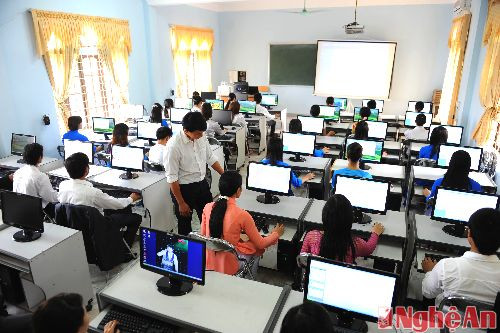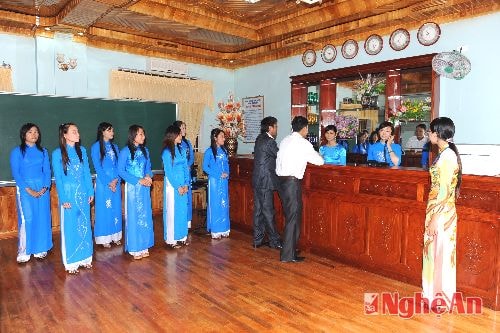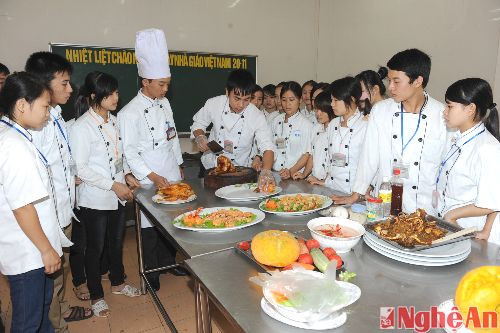Removing "bottlenecks" in tourism human resource training
(Baonghean) - For a long time, students graduating from tourism colleges and universities in the province have been assessed as being too theoretical and not meeting practical requirements. This raises the urgent need to improve training standards and promote links between schools and businesses in the direction of training with addresses...
Supply and demand imbalance
Muong Thanh Song Lam Hotel in particular and the hotel system and tourism service areas of Muong Thanh Group in general are always in a state of shortage of high-quality human resources. From now until May 2017, the group will continue to put into use 17 other hotel and tourism service projects. Therefore, Muong Thanh Group needs about more than 3,000 new employees. Muong Thanh Song Lam Hotel alone has a regular need to recruit 20-40 new employees every year.
Although recruitment notices are regularly updated publicly on the hotel's official website and through mass media, the number and quality of applications submitted by candidates are still very limited.
Mr. Vo An Huy - Deputy General Director of Saigon Kim Lien Joint Stock Company said that in recent years, hotels have had a great demand for tourism personnel but it is very difficult to recruit. A few months ago, the hotel posted a recruitment advertisement but so far there have only been nearly 20 applications. The number is small so it seems that we do not have many options in terms of candidate quality. Therefore, Saigon Kim Lien Joint Stock Company had to establish a primary vocational training center for housekeeping, desk, kitchen and reception to retrain staff, which is both time-consuming and costly.
 |
| Most of the training programs of schools are heavy on theory. |
Meanwhile, training institutions assert that there are still many students from secondary schools and colleges specializing in tourism who have graduated but do not have stable jobs. According to surveys, after graduation, depending on the time, up to 70-80% of students have jobs, but most of them are small businesses, family-sized, with unstable jobs and incomes; most of the students who graduate lack jobs in reputable, professional businesses.
| Currently, Nghe An tourism industry has about 9,000 direct and regular workers, including seasonal workers and some other fields, ranging from 15,000 to 16,000 people. Only 30% of workers have specialized training, 30% have general education in the model of motels, small-scale accommodation establishments, households... |
Training links
The reason for the current situation of both surplus and shortage of tourism human resources comes first from the fact that "supply" has not caught up with the quality requirements of "demand" and the loose connection between schools and businesses leads to a lack of information from both sides.
 |
| Students of Nghe An College of Tourism and Commerce practice reception. Photo by Sy Minh |
Most recently, at the Workshop on strengthening cooperation between training institutions and businesses in training and developing tourism human resources organized by the Project Management Board of the Environmentally and Socially Responsible Tourism Capacity Development Program (EU Project) in collaboration with the Department of Culture, Sports and Tourism, school leaders frankly admitted that the current state of training curriculum at schools still follows the traditional pattern, not suitable for the movement of reality, so when graduating, students find it difficult to catch up with work immediately. At the same time, the general level of admission of schools is currently quite low, leading to many limitations in the quality of students' learning, especially in foreign languages - an important factor that employers put first when considering personnel.
Contributing to solving this problem, the EU Project Management Board has just issued a system of Vietnam tourism vocational skills standards to support human resource development in 4 provinces of the North Central region and Nghe An is one of the beneficiaries. Mr. Vu Quoc Tri - Director of the EU Project in Vietnam affirmed: "The set of Vietnam tourism vocational skills standards is built equivalent to current international standards, has full vocational skills suitable for both training facilities and businesses and is provided completely free of charge".
 |
| Strengthen the practical part of training. |
Schools need to proactively seek, approach, and develop relationships with tourism businesses inside and outside the province. At the same time, businesses need goodwill and trust to build cooperation policies, creating opportunities for students to access real working environments. This is an urgent requirement today to develop Nghe An tourism commensurate with its potential and advantages.
Mr. Nguyen Manh Hung - Deputy General Director of Muong Thanh Song Lam Hotel: "The solution to increase the "two-house" connection is that in the process of building the training program, the school should consult with the labor-using units to ensure that it meets practical requirements. The "two houses" also need to regularly organize workshops, dialogues, seminars, internships, etc. to help students gain practical experience and improve their soft skills...". |
Phuong Chi


